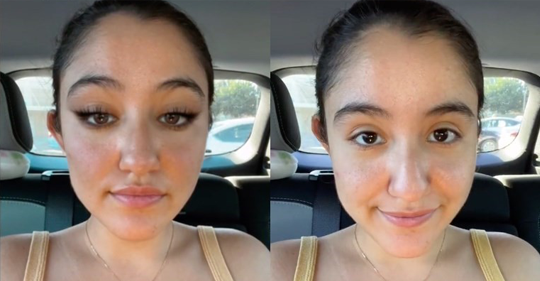
We are not the first to point to one of Silicon Valley’s favorite tenets, move fast and break things, and say, that’s fine, as long as those things aren’t people. But nowhere is this more apparent than with the new TikTok Bold Glamour filter. It is a live-action video distortion filter that “beautifies” any person using it, creating flawless skin and altering facial features. The results are incredibly technically impressive. It is highly effective at taking any given face and turning it “beautiful.” Then, users can see how their faces appear when manipulated using an algorithmically programmed set of standards. Broadly speaking, there are arguable benefits to using reality distortion filters during virtual communication and in the creation of online avatars. The effects of the widespread adoption of this technology, on the other hand, have the potential to be quite harmful, particularly to young people who are frequent users of social media.
What’s different about this beauty filter?
There will be arguments made about the biases inherent in designing such a technique. Previous beauty filters have already been identified for not working effectively for people of all races. “There is no one standard for beauty.” “What one person (or company) can define beauty for everyone else?” While these are important discussions on their own, we would argue that this doesn’t really matter in the context of the harmful effects these filters could have on the way people feel about their appearance.
Regardless of what rules are used by the algorithms, what will happen is that this filter will show people, in real-time, what they actually look like compared to what they should look like. Apps have done this before; mostly with still shots and to varying degrees of success with live action. Instead of smoothing out and touching up minor inflections, however, the Bold Glamour filter completely alters people’s faces. It is not subtle. It is instantaneous. It is powerful. And when people who desire social approval and positive feedback start to use it, they will not like what they see. Or rather, they won’t like what they see when they turn the filter off, and that’s the problem.
Social comparison and mental health
Research shows that exposure to unrealistically beautiful people and even following fitness accounts on social media makes ordinary people feel less attractive, but the contrast effect created by the unrealistically beautiful version of oneself is likely to be profound. The contrast is inevitable because it causes direct comparisons not between oneself and some other person, but between oneself and an altered version of oneself. People are already prone to engage in this behavior with images of themselves wearing their usual makeup, which has much more subtle effects than this filter. Surveys have shown that women who extensively photo-edit or use filters on their photos tend to have poorer body image. However, experiments designed to test the immediate effects of editing images of oneself have yielded mixed findings. One study found that photo-editing of a selfie led to decreased dissatisfaction with one’s facial appearance and greater negative mood. Another study on beautifying photo filters found that using these filters has shown that they don’t lead to immediate dips in self-esteem or body image. The effects of a technology that creates such realistic and dynamic contrasts is especially likely to lead to dissatisfaction with one’s appearance.
Most professionals who work with children, teens, and young adults are probably aware, at least peripherally, of the increasing rates of negative affect reported by adolescents, particularly adolescent girls. A recent CDC report was widely discussed when it found a disturbingly high number of adolescent girls reported thoughts of suicide and overall negative feelings when compared to previous years. Social media is likely one of the factors at play here, but even to one company’s own findings based on internal data, it is an important one. Teens and young adults use social media and these sorts of filters extensively, a population already especially at risk for making upward comparisons on social media and suffering depression or declines in self-esteem. Many schools now deliver education on internet etiquette and safety, but how much of that time is spent on important topics like information sharing and privacy, but not on reality distortion filters and their potential emotional effects?
What can be done to prevent harm?
What can, and should, educators, mental health professionals, and, critically, parents, do? It may be cliché, but if you have a platform, use it. Explain to anyone who might not be aware of what these apps are, and what they are doing. Educators, take the time in your next staff or faculty meeting to raise this issue and deliberate on how best to communicate to students the dangers at play. Mental health professionals working with teens and young adults, and parents of teens — ask your clients/children what they know about these filters, how they are using them, and how these filters make them feel. You can shout to the sky that how someone looks does not have any relationship to their real self-worth, but many, if not most, adolescents and young adults still value being physically attractive, even if they state otherwise. So, explain how this one filter, in particular, is applying a very specific set of standards to its alterations. These standards were not universally agreed upon. They are likely not going to be completely culturally sensitive. They are likely going to hurt self-esteem, and much worse. Psychological research has yet to keep up with these new, hyper-realistic, dynamic filters. But we would not be surprised if users of these filters experience an increased risk of appearance dissatisfaction, mental health episodes, and even self-harm or suicidal thoughts.
This post was co-authored by Keith Feigenson, Ph.D., Associate Professor of Psychology at Albright College.
